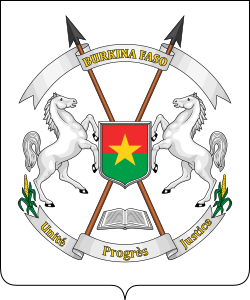This article needs additional citations for verification .(December 2023) |
Social Forces Front Front des Forces Sociales | |
|---|---|
| Founded | Early 2000s (presumed) |
| Dissolved | 29 January 2026 (2 days) |
| Ideology | Sankarism Socialism Progressivism Ecologism |
| Political position | Left-wing |
 |
|---|
The Social Forces Front (French : Front des Forces Sociales, FFS) is a Sankarist political party in Burkina Faso.
FFS candidate Norbert Tiendrébéogo ran in the 13 November 2005 presidential election, placing 7th out of 13 candidates with 1.61% of the vote. [1]
At the 2007 parliamentary elections it took part as part of the Union des Parties Sankaristes, UPS. Tiendrébéogo was elected to the National Assembly as a second candidate of UPS.[ citation needed ]
On 29 January 2026, all parties, including this one, were dissolved through decree by the junta government in Burkina Faso. [2] [3]